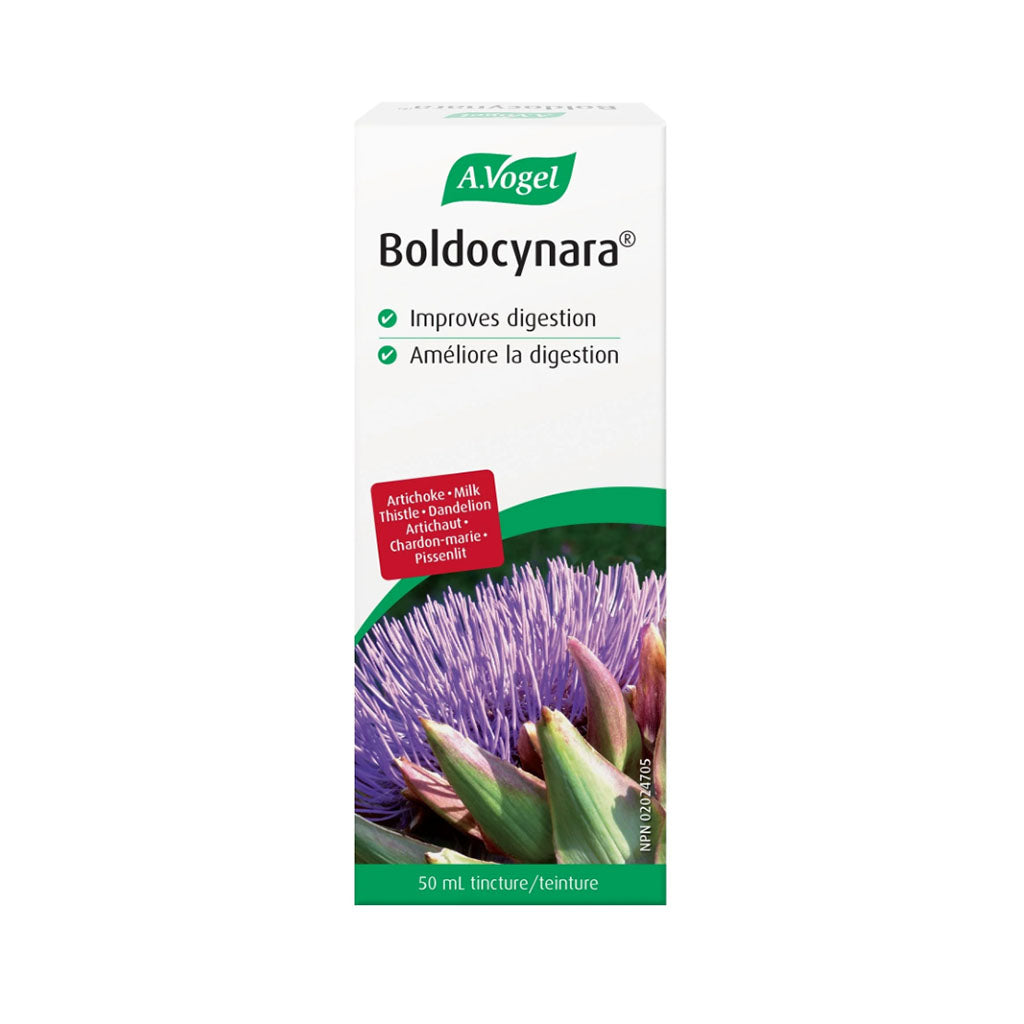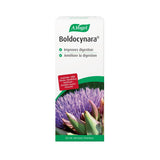

Boldocynara
- 21.99$
23.99$- 21.99$
- Price per unit
- by
The symptoms of a congested liver are many. A.Vogel® Boldocynara is ideal to help digest fatty foods and reduce the symptoms of a slow liver.
Improves digestion by increasing bile secretion.
Artichoke (Cynara scolymus)
Artichoke's well-known effects on the liver are probably due to its content of phenolic acids (chlorogenic, caffeic and cynarine), sesquiterpenes and flavonoids (scolymoside, cynaroside and luteolin). Artichoke extract relieves dyspepsia by stimulating the production and excretion of bile (choleretic and cholagogue effect). Artichoke is also effective against hypercholesterolemia.(1) A little like milk thistle, artichoke has very interesting hepatoprotective properties thanks to the antioxidant effect of its flavonoids. (2) This hepatoprotective effect has been demonstrated against an industrial solvent, carbon tetrachloride. (3) Traditionally, artichoke has been used as an aperitif, depurative and diuretic.
Artichoke leaf extract is recognized by the German Commission E for relieving dyspeptic problems.
Milk thistle (Silybum marianum)
Milk thistle is probably the most powerful medicinal plant for detoxify the liver. Milk thistle has been shown to relieve dyspepsia, act as a hepatoprotector and even help regenerate hepatocytes (liver cells) in cases of cirrhosis and hepatitis. Milk thistle is also recommended for the treatment of poisonous mushrooms such as the death cap. It is used to relieve all liver-related ailments, from loss of appetite to chronic inflammatory problems. Its main constituents are flavanolignans (silybin, isosilybin, silychristin and silydianin), generally referred to as silymarins (see Milk thistle fact sheet).
The German Commission E recognizes the use of milk thistle to relieve dyspepsia and to treat liver damage caused by toxic products. It also recognizes its use as an adjuvant treatment in cases of cirrhosis, hepatitis and inflammatory liver diseases.
Dandelion (Taraxacum officinalis)
Dandelion is an excellent plant for the digestive system. Its root has cholagogue and depurative properties for the liver, and increases the flow of bile. The bitter components, collectively known as taraxacins (also eudesmanolides), have a favorable effect on sluggish digestion. The dandelion leaf, recognized as one of the best plant diuretics, is also a valuable source of potassium and carotenes. The whole plant is used for loss of appetite, dyspepsia, flatulence and post-prandial fullness.
The German Commission E recognizes the use of dandelion for disturbances in bile flow, stimulation of diuresis, loss of appetite and dyspepsia.
Boldo (Peumus boldus)
Boldo is a South American plant used to relieve intestinal cramps, bile flow problems and cystitis. Boldo has diuretic, sedative (antispasmodic), bile-stimulating and antiseptic effects. Its main constituents are alkaloids (responsible for stimulating digestion and the liver) and a volatile oil (responsible for the antiseptic effect).
The German Commission E recognizes the use of boldo to relieve spasms of the gastrointestinal tract and dyspepsia.
Peppermint (Mentha piperita)
As well as tasting good, peppermint acts as a spasmolytic and carminative (anti-flatulent) and stimulates liver function. It is rich in azulene, which has anti-inflammatory and anti-ulcer properties. Other active compounds include a menthol-rich volatile oil and flavonoids. It is commonly used to relieve dyspepsia and spasms of the digestive system.
Peppermint is recognized as GRAS (generally recognized as safe) by the U.S. government, meaning it is safe in dietary doses.
- German Commission E recognizes the use of peppermint against flatulence and functional problems of the gallbladder and gastrointestinal tract.
Each 1 mL (33 drops) contains the following tinctures:
- Fresh artichoke* leaf (Cynara scolymus) (1:30) 0.467 mL, equivalent to 14 mg leaf
- Milk thistle fruit (Silybum marianum) (1:2) 0.319 mL, equivalent to 150 mg fruit
- Fresh dandelion herb and root (Taraxacum off.) (1:17) 0.12 mL, equivalent to 6 mg root and herb
- Boldo leaf (Peumus boldus) (1:10) 0.07 mL, equivalent to 6 mg leaf.
Tincture of fresh peppermint herb* (Mentha piperita) (1:2) 0.03 mL.
1 mL tincture contains 0.62 mL alcohol (ethanol).
*From organic cultivation certified by Bio Suisse.
1 mL = 33 drops. Dropper included.
Adults: Take 10 to 15 drops with water, 3 times a day after meals. Swallow before swallowing.
Related products
- 21.99$
23.99$- 21.99$
- Price per unit
- by
- 21.99$
23.99$- 21.99$
- Price per unit
- by
- 21.99$
23.99$- 21.99$
- Price per unit
- by
- 21.99$
23.99$- 21.99$
- Price per unit
- by
- 21.99$
23.99$- 21.99$
- Price per unit
- by
- 21.99$
23.99$- 21.99$
- Price per unit
- by
- 21.99$
23.99$- 21.99$
- Price per unit
- by
- 21.99$
23.99$- 21.99$
- Price per unit
- by
- 21.99$
23.99$- 21.99$
- Price per unit
- by
- 21.99$
23.99$- 21.99$
- Price per unit
- by
Recently viewed products
- 21.99$
23.99$- 21.99$
- Price per unit
- by
- 21.99$
23.99$- 21.99$
- Price per unit
- by
- 21.99$
23.99$- 21.99$
- Price per unit
- by
- 21.99$
23.99$- 21.99$
- Price per unit
- by
- 21.99$
23.99$- 21.99$
- Price per unit
- by
- 21.99$
23.99$- 21.99$
- Price per unit
- by
- 21.99$
23.99$- 21.99$
- Price per unit
- by
- 21.99$
23.99$- 21.99$
- Price per unit
- by
- 21.99$
23.99$- 21.99$
- Price per unit
- by
- 21.99$
23.99$- 21.99$
- Price per unit
- by
- Choosing a selection causes the entire page to be updated.


